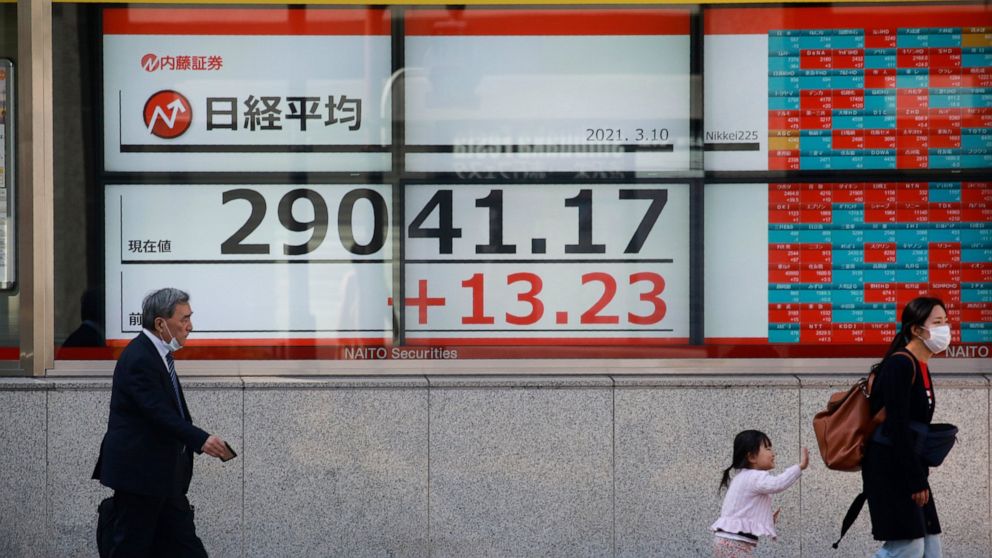Stocks have a solid start on Wall Street, led by technology
BEIJING — Technology companies are off to another good start on Wall Street, a day after powering a 3.7% surge in the Nasdaq. The gains early Wednesday were more moderate, with the Nasdaq up 1% and the broader S&P 500 up 0.6%. Small-company stocks did better than the rest of the market, as they’ve done since the beginning of the year. That’s a sign investors expect U.S. economic growth to pick up. Bond trading was stable, giving markets some relief after sharp spikes in long-term borrowing rates over the past month spooked investors and prompted them to dump technology stocks.
THIS IS A BREAKING NEWS UPDATE. AP’s earlier story follows below.
Global stocks were mixed Wednesday after Wall Street rose on a rally for major tech companies.
London and Frankfurt opened lower while Tokyo and Hong Kong advanced. Shanghai and Seoul also declined.
Wall Street futures were lower after the benchmark S&P 500 index rose Tuesday on gains for Apple, Amazon and other tech majors. The Nasdaq composite index, dominated by tech shares, surged 3.7% for its biggest gain in four months.
Markets have been adjusting to a rise in long-term interest rates in the bond market, which has pulled money out of stocks. A reversal in bond market trends at least temporarily sent investors back to companies they hope will thrive after the coronavirus pandemic ends.
The swing shows “how fragile sentiment has become, driven by the absolute uncertainty” about the outlook for interest rates and inflation, said Stephen Innes of Axi in a report.
In early trading, the FTSE 100 in London rose 0.6% to 6,686.70 and Frankfurt’s DAX added 0.1% to 14,420.95. The CAC 40 in Paris advanced less than 0.1% to 5,920.13.
On Wall Street, futures for the S&P 500 index and the Dow Jones Industrial Average were up less than 0.1%.
On Tuesday, the S&P 500 rose 1.4%. Communication companies and those that rely on consumer spending contributed to the increase. Financial, energy and industrial stocks lagged the broader market.
Apple rose 4.1%, chipmaker Nvidia climbed 8% and Tesla jumped 19.6% for the biggest gain in the S&P 500.
The Dow, weighted less toward tech, rose 0.1%.
Despite its gain, the Nasdaq is 7.2% below its Feb. 12 high. On Monday it closed 10% below its peak in what is known as a correction on Wall Street.
In Asia, the Shanghai Composite Index ended down less than 0.1% at 3,357.14 after spending most of the day in positive territory.
The Nikkei 225 in Tokyo advanced less than 0.1% to 29,036.56. The Hang Seng in Hong Kong added 0.5% to 28,907.52.
The Kospi in Seoul lost 0.6% to 2,958.12 while Australia’s S&P-ASX 200 slid 0.8% to 6,714.10.
India’s Sensex rose 0.5% to 51,272.76. New Zealand and Indonesia rose while Singapore retreated.
On Wall Street, big tech stocks that fueled last year’s rebound after the coronavirus outbreak upended the global economy have been shedding gains since the Nasdaq peak on Feb. 12.
Apple was down 14% through the end of last week.
Financial sector stocks, which had benefited from the rise in bond yields, were the biggest decliners Tuesday. Bank of America fell 2.2%, while American Express slid 3.4%. Banks and credit card issuers tend to do well when interest rates are rising because they can charge higher rates.
Bond yields, or the difference between the current market price and the payout at maturity, have been widening due to rising expectations for growth and the inflation that could follow. Inflation erodes the value of that future bond payout, encouraging investors to shift to stocks.
The fall in bond prices drew investors who didn’t want to pay high prices for stocks, especially tech stocks that looked most expensive.
Investors are betting the $1.9 trillion in coming government stimulus will help lift the U.S. economy out of its coronavirus-induced malaise. The package set for final approval in the U.S. House on Wednesday provides direct payments of up to $1,400 for most Americans and extends emergency unemployment benefits that help to support consumer spending, the economy’s main engine.
In energy markets, benchmark U.S. crude lost 33 cents to $63.68 per barrel in electronic trading on the New York Mercantile Exchange. The contract sank $1.04 on Tuesday to $64.01. Brent crude, used to price international oils, declined 46 cents to $67.07 per barrel in London. It retreated 72 cents the previous session to $67.52.
The dollar rose to 108.82 yen from Tuesday’s 108.47 yen. The euro declined to $1.1876 from $1.1901.
![]()


